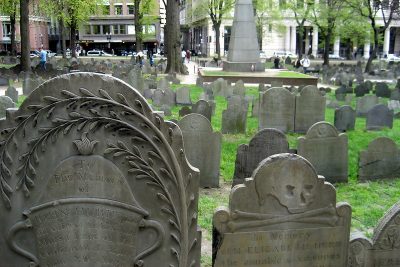The City of Boston is searching for the original locations of 11 gravestones being held at the historic burying grounds archives in West Roxbury.

Many of the gravestones date back to the 1600s and 1700s, and may have been repurposed as building materials or removed for maintenance, according to a City press release.
Part of the Historic Burying Grounds Initiative, preserving these gravestones will honor Boston’s history and founding members, Boston Parks and Recreation officials said on background.
The gravestones are all intact, but officials lack necessary records to place them in the correct area, according to the officials.
David Lambert, chief genealogist at the New England Historic Genealogical Society, said much of genealogical research aims to learn how a person died, where they died and who their parents were.
So far, he hasn’t pinpointed where the gravestones came from, but Lambert said he has some idea whose gravestones they may be and hopes descendants will be able to provide more information.
“Names are really important,” Lambert said. “The other thing you have to keep in mind is that names, how they were spelled in the 1600s and the 1700s, may not be contemporary with the correct spelling now.”
Lambert has been researching the gravestone of Elizabeth Harlow, the daughter of Eleazer and Elizabeth Harlow, who died on April 6, 1762.
Eleazer Harlow’s gravestone was found in the Dingley Cemetery in Duxbury, where he married Elizabeth in 1758. Lambert said although this discovery is not conclusive, it suggests Elizabeth Harlow’s grave belongs in Duxbury.
Headstone style could also help identify the gravestones, Lambert said, because similarities indicate they may have had the same carver.
While the City might find the specific burial grounds for the gravestones, it’s unlikely for them to be placed at the site of the corresponding remains, according to the Parks officials.
The City will archive the gravestones until more clues emerge if they cannot currently identify the correct locations.
Lambert said these gravestones signify an important part of American history.
“Gravestones, for a famous or an infamous person, are just as important as they are for your own ancestor, because they tell a story [of the] passing of an individual,” Lambert said. “Every person tells a chapter for older American history … it’s so important to preserve them.”


















































































































